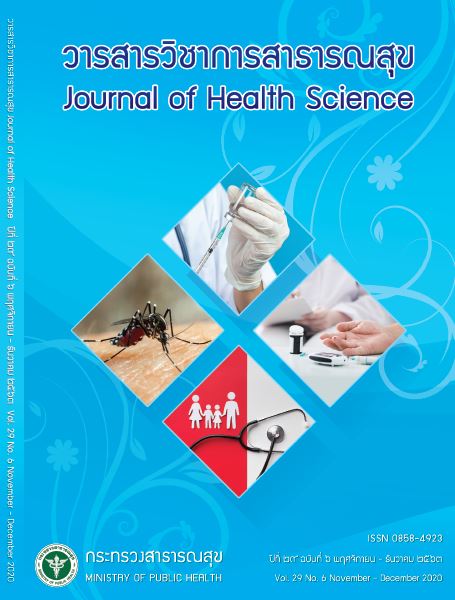คุณลักษณะและปัจจัยที่สัมพันธ์กับระดับความเข้มข้น ของ f-Hb จากการตรวจคัดกรองโรคมะเร็งลำไส้ใหญ่ และลำไส้ตรงด้วยวิธี Fecal Immunochemical Test
คำสำคัญ:
โรคมะเร็งลำไส้ใหญ่/ไส้ตรง, วิธี fecal immunochemical test, การตรวจคัดกรองโรคบทคัดย่อ
โรคมะเร็งลำไส้ใหญ่/ไส้ตรงพบมากเป็นที่ 4 ของมะเร็งทั้งหมดทั่วโลก ในประเทศไทยพบชายมากกว่าหญิงและมี แนวโน้มเพิ่มขึ้นตามอายุ การตรวจคัดกรองโรค CRC สามารถป้ องกันและลดการเสียชีวิตได้ โดยเฉพาะวิธี Fecal immunochemical test (FIT) ซึ่งระดับความเข้มข้นฮีโมโกลบิน (f-Hb) ที่ได้ ยังสามารถนำมาใช้กำหนดเป็นตัวแปร แทนผลลัพธ์สุดท้าย (surrogate endpoint) เพื่อทำนายโอกาสการเกิดโรค CRC วัตถุประสงค์ครั้งนี้ เพื่อศึกษาปัจจัย ที่สัมพันธ์กับระดับความเข้มข้นของ f-Hb 3 ระดับ ได้แก่ ระหว่าง 1-99 ngHb/ml, 100-449 ngHb/ml และ 450 ngHb/ml ขึ้นไป กลุ่มตัวอย่าง ได้แก่ ประชากรที่มีอายุ 45-74 ปีและถูกสุ่มเข้ากลุ่มศึกษา ซึ่งได้รับชุดตรวจคัดกรอง โรค CRC ด้วยวิธี FIT และมีค่าระดับความเข้มข้นฮีโมโกลบิน (f-Hb) ภายใต้โครงการวิจัยเชิงทดลองระดับชุมชน สำหรับการตรวจคัดกรองโรคมะเร็งลำไส้ใหญ่/ไส้ตรง อำเภอน้ำพอง จังหวัดขอนแก่น ช่วงพฤษภาคม 2559 ถึง ธันวาคม 2560 จำนวน 1,703 ราย วิเคราะห์ข้อมูลด้วยสถิติพรรณนาและสมการถดถอย Ordinal logistic ผลการ ศึกษาพบว่า กลุ่มตัวอย่างมีผลบวก (ร้อยละ 9.6) โดยจำนวนนี้พบชาย (ร้อยละ 17.0) อายุ 65-74 ปี (ร้อยละ 18.3) สูบบุหรี่ (ร้อยละ 17.1) บริโภคเนื้อแดงมาก (ร้อยละ 14.0) ไม่ออกกำลังกาย (ร้อยละ 13.7) ระดับ BMI 23 kg/m2 ขึ้นไป (ร้อยละ 14.0) และมีประวัติคนในครอบครัวเป็นโรคมะเร็ง (ร้อยละ 13.7) โดยพบปัจจัยเสี่ยงที่ มีนัยสำคัญทางสถิติเพียงปัจจัยเดียว ได้แก่ ช่วงอายุ 65-74 ปี (adjOR=1.65, 1.16 – 2.37, p=0.006) ดังนั้น ประชากรในกลุ่มอายุ 65-74 ปี ควรมีการเฝ้าระวังเพื่อตรวจคัดกรองโรคมะเร็งลำไส้ใหญ่/ไส้ตรงอย่างต่อเนื่องและ การศึกษาครั้งต่อไป ควรนำปัจจัยการบริโภคมาพิจารณาร่วมกับผลลัพธ์ระดับ f-Hb
Downloads
เอกสารอ้างอิง
Bray F, Ferlay J, Soerjomataram I, Siegel RL, Torre LA, Jemal A. Global cancer statistics 2018: GLOBOCAN estimates of incidence and mortality worldwide for 36 cancers in 185 countries. CA Cancer J Clin [Internet]. 2018 [cited 2020 Jul 10];68(6):394–424. Available from: https://onlinelibrary.wiley.com/doi/abs/ 10.3322/caac.21492
Torre LA, Bray F, Siegel RL, Ferlay J, Lortet-Tieulent J, Jemal A. Global cancer statistics, 2012. CA Cancer J Clin [Internet]. 2015 [cited 2020 Jul 10];65(2):87– 108. Available from: https://doi.org/10.3322/ caac.21262
Arnold M, Sierra MS, Laversanne M, Soerjomataram I, Jemal A, Bray F. Global patterns and trends in colorectal cancer incidence and mortality. Gut [Internet]. 2017 [cited 2020 Jul 10];66(4):683. Available from: http:// gut.bmj.com/content/66/4/683.abstract
Pourhoseingholi MA. Increased burden of colorectal cancer in Asia. World J Gastrointest Oncol [Internet]. 2012 [cited 2020 Jul 10];4(4):68–70. Available from: http://www.ncbi.nlm.nih.gov/pmc/articles/ PMC3334381/
Virani S, Bilheem S, Chansaard W, Chitapanarux I, Daoprasert K, Khuanchana S, et al. National and subnational population-based incidence of cancer in Thailand: Assessing Cancers with the Highest Burdens. Cancers (Basel) [Internet]. 2017 [cited 2020 Jul 10];9(8):108. Available from: http://www.ncbi.nlm.nih.gov/pmc/ articles/PMC5575611/
Sarakarn P, Suwanrungruang K, Vatanasapt P, Wiangnon S, Promthet S, Jenwitheesuk K, et al. Joinpoint analysis trends in the incidence of colorectal cancer in Khon Kaen, Thailand (1989 – 2012). Asian Pac J Cancer Prev [Internet]. 2017 [cited 2020 Jul 10];18(4):1039–43. Available from: http://www.ncbi.nlm.nih.gov/pmc/ articles/PMC5494213/
HuxleyR, Ansary-Moghaddam A, TH L, Ueshima H, DF G, HC K, et al. The role of lifestyle risk factors on mortality from colorectal cancer in populations of the Asia-Pacific region. Asian Pac J Cancer Prev 2007;8(2): 191–8.
Moskal A, Norat T, Ferrari P, Riboli E. Alcohol intake and colorectal cancer risk: A dose–response meta-analysis of published cohort studies. Int J Cancer [Internet]. 2007 [cited 2020 Jul 10];120(3):664–71. Available from: https://onlinelibrary.wiley.com/doi/ abs/10.1002/ijc.22299
Tsong WH, Koh WP, Yuan JM, Wang R, Sun CL, Yu MC. Cigarettes and alcohol in relation to colorectal cancer: the Singapore Chinese Health Study. Br J Cancer [Internet]. 2007 [cited 2020 Jul 10];96(5):821–7. Available from: https://www.ncbi.nlm.nih.gov/pubmed/ 17311023
Alexander DD, Weed DL, Miller PE, Mohamed MA. Red meat and colorectal cancer: a quantitative update on the state of the epidemiologic science. J Am Coll Nutr [Internet]. 2015 [cited 2020 Jul 10];34(6):521–43.Available from: https://www.ncbi.nlm.nih.gov/ pubmed/25941850
ปริญญา ทวีชัยการ. มะเร็งลำไส้ใหญ่และทวารหนัก. กรุงเทพมหานคร: อมรินทร์พริ้นติ้งแอนด์พับลิชชิ่ง; 2554.
Issa IA, Noureddine M. Colorectal cancer screening: an updated review of the available options. World J Gastroenterol [Internet]. 2017 [cited 2020 Jul 10];23(28): 5086–96. Available from: https://www.ncbi.nlm.nih. gov/pubmed/28811705
Issaka RB, Avila P, Whitaker E, Bent S, Somsouk M. Population health interventions to improve colorectal cancer screening by fecal immunochemical tests: A systematic review. Prev Med [Internet]. 2019 [cited 2020 Jul 10];118:113–21. Available from: http://www. sciencedirect.com/science/article/pii/S00917435 18303402
Lee YC, Chen SLS, Yen AMF, Chiu SYH, Fann JCY, Chuang SL, et al. Association between colorectal cancer mortality and gradient fecal hemoglobin concentration in colonoscopy noncompliers. J Natl Cancer Inst [Internet]. 2017 [cited 2020 Jul 10];109(5):djw269. Available from: https://www.ncbi.nlm.nih.gov/pubmed/28376 228
Fraser CG, Mathew CM, McKay K, Carey FA, Steele RJC. Automated immunochemical quantitation of haemoglobin in faeces collected on cards for screening for colorectal cancer. Gut [Internet]. 2008 [cited 2020 Jul 10];57(9):1256–60. Available from: https://gut.bmj. com/content/gutjnl/57/9/1256.full.pdf
Yen AMF, Chen SLS, Chiu SYH, Fann JCY, Wang PE, Lin SC, et al. A new insight into fecal hemoglobin concentration-dependent predictor for colorectal neoplasia. Int J Cancer [Internet]. 2014 [cited 2020 Jul 10];135(5): 1203–12. Available from: https://onlinelibrary.wiley. com/doi/abs/10.1002/ijc.28748
Garcia M, Milà N, Binefa G, Benito L, Gonzalo N, Moreno V. Fecal hemoglobin concentration as a measure of risk to tailor colorectal cancer screening: are we there yet? Eur J Cancer Prev [Internet]. 2015 [cited 2020 Jul 10];24(4):321–7. Available from: https://journals. lww.com/eurjcancerprev/Fulltext/2015/07000/Fecal_hemoglobin_concentration_as_a_measure_of.7.aspx
Chen LS, Yen AM, Fraser CG, Chiu SY, Fann JC, Wang PE, et al. Impact of faecal haemoglobin concentration on colorectal cancer mortality and all-cause death. BMJ Open [Internet]. 2013 [cited 2020 Jul 10];3(11):e003740. Available from: https://www.ncbi.nlm.nih.gov/ pubmed/24202058
Sarakarn XP, Promthet S, Vatanasapt P, Tipsunthonsak N, Jenwitheesuk K, Maneenin N, et al. Preliminary Results: colorectal cancer screening using fecal immunochemical test (FIT) in a Thai Population aged 45-74 years: a population-based randomized controlled trial. Asian Pac J Cancer Prev [Internet]. 2017 [cited 2020 Jul 10];18(10):2883–90. Available from: http://www. ncbi.nlm.nih.gov/pmc/articles/PMC5747418/
Chiang TH, Lee YC, Liao WC, Chung JH, Chiu HM, Tu CH, et al. Timing and risk factors for a positive fecal immunochemical test in subsequent screening for colorectal neoplasms. PLoS One 2015;10(9):1–14.
Kudo S, Kudo T. The necessity of colorectal cancer screening for elderly patients. Transl Gastroenterol Hepatol 2017;2(1):19.
Wong MC, Ding H, Wang J, Chan PS, Huang J. Prevalence and risk factors of colorectal cancer in Asia. Intest Res 2019;17(3):317–29.
Hajian-Tilaki K. Sample size estimation in epidemiologic studies. Casp J Intern Med 2011;2(4):289–98.
Johnson CM, Wei C, Ensor JE, Smolenski DJ, Amos CI, Levin B, et al. Meta-analyses of colorectal cancer risk factors. Cancer Causes Control [Internet]. 2013 [cited 2020 Jul 10];24(6):1207–22. Available from: https:// www.ncbi.nlm.nih.gov/pubmed/23563998
Hamada T, Kosumi K, Nakai Y, Koike K. Surrogate study endpoints in the era of cancer immunotherapy. Ann Transl Med 2018;6(S1):S27.
ดาวน์โหลด
เผยแพร่แล้ว
วิธีการอ้างอิง
ฉบับ
บท
การอนุญาต

This work is licensed under a Creative Commons Attribution-NonCommercial-NoDerivatives 4.0 International License.







